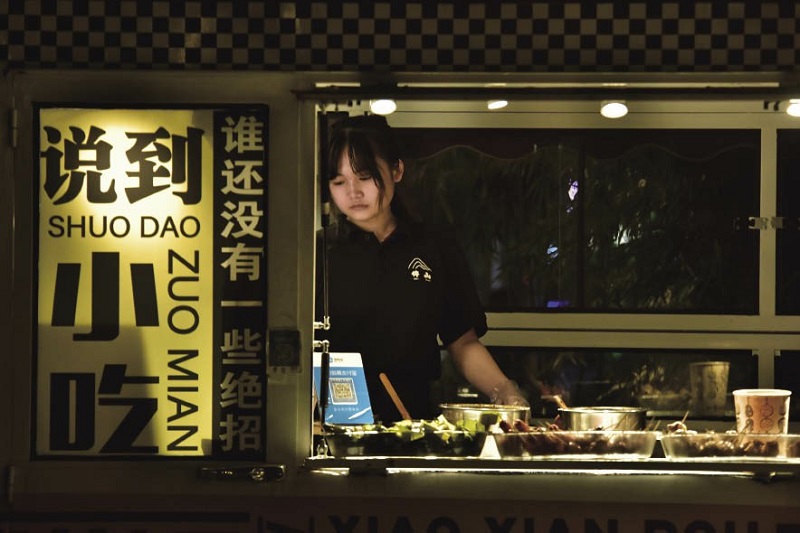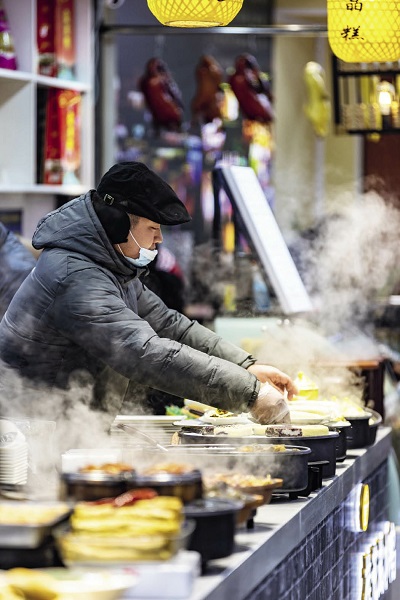
At about 4 a.m. every morning, he gets up to prepare the dough and make the noodles. When he finishes, customers begin to show up. Normally, he serves customers till around 8 p.m. or a bit later. Sometimes Li envies those who can finish work earlier. He admits that running a small business is not easy, but the upside is more flexibility: he can leave the post whenever there are urgent family affairs to attend to.
The Lis are an epitome of the 200 million Chinese who operate more than 80 million small stores around the country. As humble as they are, these small businesses convey the ambition of young entrepreneurs, provide a stable living for couples who aspire to settle down after hopping from one temporary job to another, and enliven communities, towns, and cities.

An attendant selling food at a food stall in the scenic Banbian Street of Shushan District, Hefei of Anhui Province.
Surviving a Time of Fast Changes
In 2019 Du opened an 80-square-meter convenience store in eastern Beijing. The annual rent is RMB 400,000, and he spent an additional RMB 200,000 on decoration and stocking. The cost has not yet been recovered due to the pandemic.
Du has been in the convenience store business in Beijing for nearly 30 years. His last store was at Dongzhimen, one of the busiest passenger depots in the city. The big crowds coming in and out of the region everyday brought him good business. However, he had to move out after the lease was terminated due to a renovation project in the region.
His current store is located by residential areas, so its customers are mostly local residents who come for groceries after work. They often exchange a few words with Du when checking out, a moment Du enjoys as a member of the local community.
Within a diameter of one kilometer there are two more convenience stores. To stay ahead in the competition, Du looks every day for new ways to attract customers, especially the young generation. When a fried chicken store opened next door, he set up two barrels of beer in his shop, thinking young people who buy fried chicken would love to grab some beer to go with it.
Du also thought of redesigning the space. “The layout is too conservative,” he complained, looking to the crammed shelves. Joining a franchise might have brought about the change he yearned for, he once thought, but he dropped the idea when learning that membership fee is a whopping RMB 800,000.
“At my age, I am not as creative as young people,” he said. Though he understands that to change the old image of being a quaint mom-and-pop neighborhood store, he needs to hire a professional team to reinvent the décor and management, but the cost is too much for him to bear. He also considered opening more stores, but hesitated out of worry for lease uncertainties brought about by district gentrification, which is prevalent in Chinese cities.
According to Pan Helin, executive dean of the Digital Economy Institute of Zhongnan University of Economics and Law and coauthor of New Infrastructure, New Engine of Chinese Economy, convenience stores primarily serve residents of neighboring communities. They therefore should carry out a thorough study of the needs of their target customers, and accordingly find their niche in the market. What’s more, they should develop their own features: if their commodities are largely the same as those of their competitors, they can stand out with distinctive décor, historical relevance, or cultural ambience.
Fu Yifu, a researcher with Suning Institute of Finance, observes that small stores are on the course of digitalization. For owners of brick-and-mortar shops, this means more entrants need to establish a digital system, transfer to the digital mode of stocking, tallying, and retailing, and learn the know-how in digital operation.

A man operating a breakfast stand near the Confucius Temple in Nanjing on New Year’s Day of 2021. The region attracts hordes of tourists all year round.
Partners of Two Generations
Young entrepreneurs are often found behind the small stores with great fame online. They understand the power of the Internet and know how to harness it.
Ah Yan, in his 20s, was formerly employed in the IT industry. At the end of 2018, he opened a barbecue bar as a gathering ground for his friends. He was prepared for losses in the first six months, but to his surprise, the bar became a sensation from the very first month. The reason; a person running a popular food blog noticed the bar, and recommended it to their many followers. Immediately customers flocked in. By the fourth month Ah Yan had recovered the investment of RMB 300,000. “I was so busy (receiving customers) that often I could not find the time to have a drink with my friends before they had to leave,” he said.
Ah Yan has a partner from his hometown in northeastern China, a chef whom he calls Brother Bao. While Ah Yan was occupied with his IT job, Bao would tend the bar. Bao, in his 40s, has managed four stores. Now his wife runs their small supermarket, and he attends the other three – a flower shop, a barbecue bar, and a souvenir store. He spends most of the day in his flower shop, and prepares the barbecue when he has time. Starting at about 4 p.m. he sets up flower arrangements in the bar, which beautify the space, and are also open for orders from customers. When business is low during rainy days, Bao makes arts and crafts for sale. “I don’t like to idle around. I want to create more value with my skills,” he explained.
As people of two different generations, Ah Yan and Brother Bao don’t always see eye to eye on everything in their business. For instance, Bao argues the bar should provide as much food as possible to appeal to more customers; while Ah Yan insists it should focus on a narrower range of foods that it is best at.
The difference also lies in their devotion to the store, which was a side business for Ah Yan but a main occupation for Bao. With a stable income from his IT job, Ah Yan was not so concerned about the bar’s performance. This is why he closed it for three days during last year’s National Day holiday, known as the golden week for the catering industry, to travel out of the city. Bao, by contrast, cannot get KPI (Key Performance Indicator) out of his mind for even a moment. Small business owners like him always try to make more money to cover the rent and their staff’s salary, and to create more profits for themselves. They are therefore in perpetual fear: fear for failure when business slumps and fear for unsustainable success when business booms.
Last August Ah Yan quit his IT job to be fully committed to the bar. He plans to open another startup or try other jobs after its business improves. “Running this eatery probably won’t consume all my energy.”

A grocery store owner dressed up in a traditional Chinese robe greets customers on April 29, 2020, anticipating an increase of tourists in Hangzhou, Zhejiang Province during the May Labor Holiday.
Difference Sells
It is difficult maintaining one’s own unique features in fierce competition. Ah Yan drew up various plans for his barbecue bar before deciding on one. At first he thought of modeling it after the native Beijing style, like other small businesses in Nanluoguxiang, a tourist district in central Beijing known for traditional courtyard homes in narrow, winding alleys. When durian cake was all the rage last year, he noticed many stores in the main street near his bar served it. But he finally decided his bar doesn’t have to follow the trend. Unlike his peers in the main street, he caters to repeat customers.
“People-to-people connection is a rarity nowadays,” Ah Yan said. He hopes his bar can create this connection. “Customers see we are busy, and exchange a few words with us from time to time. We recognize each other during their later visits. This feels great.” A man from Tianjin, 130 kilometers away from Beijing, comes to the bar regularly, sometimes three times a week. And some others take taxis here from the other end of the city, paying more on the drive than the food. “They come for a sense of belonging,” Bao added.
It is common that stores in tourist sites and commercial districts sell identical goods that are often from the same sources, such as Yiwu, the largest distribution center of small commodities in China. To change this situation, Pan Helin suggests an integrated production and marketing system for gifts tailor-made for specific tourist sites. It can come in the form of a digital platform on which store owners present their demands for desired products. After these demands from different retailers in the same region are assorted by the platform, the information is sent to manufacturers to order for gifts of local features.
Zhou Shengkai from Zhejiang Province opened a custom T-shirt store in Nanluoguxiang after noticing that most such T-shirts sold at tourist sites lack ingenuity. “My motivation was to open a store in a cosmopolitan city to disseminate Chinese culture among international visitors,” he said.
But it is expensive to rent a storefront in big cities, especially in commercial districts and near tourist sites. It is not rare that some businesses cannot make enough profits to cover their rent and soon close. One store in Nanluoguxiang, for instance, changed hands 38 times in the space of 11 months. Struggling to stay afloat, Zhou hopes the state could provide policy support for businesses of innovation in cultural products in tourist resorts. He admitted that he might close his store if sales do not pick up in the coming months.
“Stability and predictability of policies are important for small store owners,” said Wang Jingyi, a researcher with the Institute of Digital Finance, Peking University. These proprietors often feel overlooked by state policies. In addition to rents and costs, they are also concerned about policy changes.
Du, the convenience store owner, hopes to find low-cost ways to learn how to renovate small shops, and that the local government could make it easier for non-native self-employed people like him to pay social insurance.
In July 2020 several central agencies including the Ministry of Commerce issued a document to promote the development of small stores, aiming to build 1,000 districts of small shops with big buzz and crowds. This sets higher demands for policymakers in cities, as “big buzz and crowds” are often associated with poor sanitation and disorder. This actually can be solved through coordinated efforts by regulatory and supervisory authorities, Wang said.
ZHAO LIMEI is an intern reporter and NING DI is a reporter with China Youth Daily.